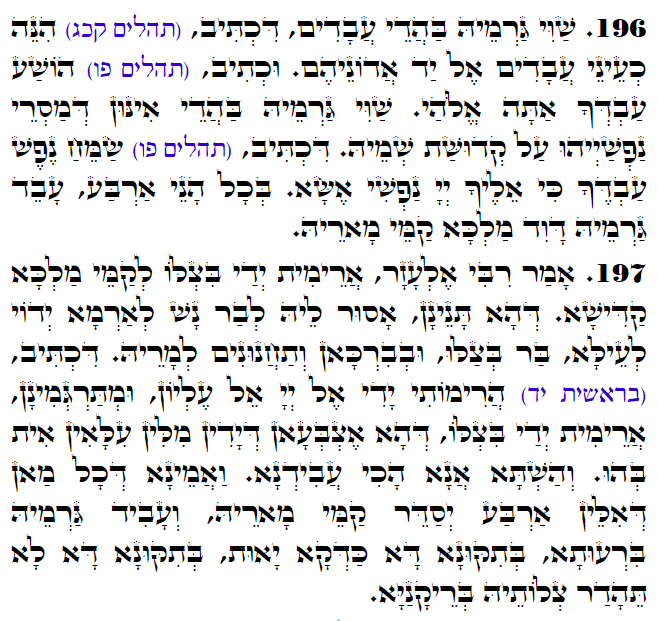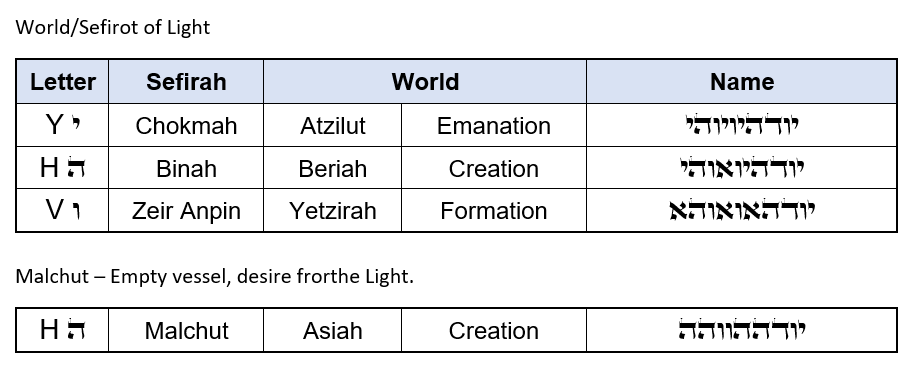Daily Zohar # 3114 – Balak – I lifted my hands to…

.
Hebrew translation:
197. אָמַר רַבִּי אֶלְעָזָר, הֵרַמְתִּי יָדִי בִּתְפִלָּה לִפְנֵי הַמֶּלֶךְ הַקָּדוֹשׁ. שֶׁהֲרֵי שָׁנִינוּ, אָסוּר לוֹ לָאָדָם לְהָרִים יָדָיו לְמַעְלָה פְּרָט לִתְפִלָּה, וּבִבְרָכוֹת וּבְתַחֲנוּנִים לַאֲדוֹנוֹ, שֶׁכָּתוּב (בראשית יד) הֲרִמֹתִי יָדִי אֶל ה’ אֵל עֶלְיוֹן, וּמְתַרְגְּמִים: הֵרַמְתִּי יָדִי בִּתְפִלָּה. שֶׁהֲרֵי בְּאֶצְבְּעוֹת הַיָּדַיִם יֵשׁ דְּבָרִים עֶלְיוֹנִים. וְכָעֵת כָּךְ אֲנִי עוֹשֶׂה, וְאוֹמֵר שֶׁכָּל מִי שֶׁאַרְבָּעָה אֵלּוּ יְסַדֵּר לִפְנֵי אֲדוֹנוֹ וְעוֹשֶׂה עַצְמוֹ בְרָצוֹן בְּתִקּוּן זֶה כָּרָאוּי, בְּתִקּוּן זֶה לֹא תַחֲזֹר תְּפִלָּתוֹ רֵיקָם.
.
Zohar Balak
#196
The Zohar asks how do we know that King David portrayed himself as a servant and to explain quotes David’s words in Psalms 123:2
“הִנֵּה כְעֵינֵי עֲבָדִים אֶל יַד אֲדוֹנֵיהֶם כְּעֵינֵי שִׁפְחָה אֶל יַד גְּבִרְתָּהּ כֵּן עֵינֵינוּ אֶל יְהוָה אֱלֹהֵינוּ עַד שֶׁיְּחָנֵּנוּ.”
“As the eyes of servants look to the hand of their master, as the eyes of a maidservant look to the hand of her mistress, so our eyes are on YHVH our God until He shows us mercy.”
And Psalms 86:2
“שָׁמְרָה נַפְשִׁי כִּי חָסִיד אָנִי הוֹשַׁע עַבְדְּךָ אַתָּה אֱלֹהַי הַבּוֹטֵחַ אֵלֶיךָ.”
“Preserve my soul, for I am godly. You are my God; save Your servant who trusts in You.”
And how do we know that he portrayed himself as a martyr?
Psalms 86:4
“שַׂמֵּחַ נֶפֶשׁ עַבְדֶּךָ כִּי אֵלֶיךָ אֲדֹנָי נַפְשִׁי אֶשָּׂא.”
“Bring joy to Your servant, for to You, O Lord, I raise my soul.”
King David prayed to God in four ways; poor, Chassid, Martyr and as a servant.
#197
Genesis 14:22
“וַיֹּאמֶר אַבְרָם אֶל מֶלֶךְ סְדֹם הֲרִימֹתִי יָדִי אֶל יְהוָה אֵל עֶלְיוֹן קֹנֵה שָׁמַיִם וָאָרֶץ.”
“But Abram said to the king of Sodom, “I have lifted my hand to YHVH, God Most High, Possessor of heaven and earth,”
Rabbi Elazar says that it is forbidden for a person to raise his hands above his head except during prayers and blessings. There are supernal secrets related to the fingers of the hands and when a person set his prayers in four ways like King David, with raising the hands, and with proper consciousness, his prayer won’t return empty.
Lesson;
The two hands with ten fingers represent the ten Sefirot of Malchut, lower H ה of the YHVH name. When we pray and raise our hands, we connect Malchut to the upper levels of light, represented by the YHV יהו of the name.
Each hand has 14 bone segments and together 28 that represents the Hebrew word ‘כח’, ‘Power/force’.
The first verse of the Torah has 28 letters and adding the word ‘יד’, ‘hand’ with the value 14, gives us 42 that represents the force of Creation.
The YHVH name (4 letters) with its expression in the worlds of Atzilut, Briah, and Yetzirah gives us 14 letters for each level and together 42 as we see below
When we raise our hands above our head, with the fingers stretched up, we form a spiritual connection to the upper three worlds. Without a prayer or a blessing, it is like using the name of God for no specific purpose. In such a case, an angel comes and inflict judgment on that person.
Read more about the ‘hand’
https://dailyzohar.com/daily-zohar-2509/
{||}

 Previous: Balak
Previous: Balak

